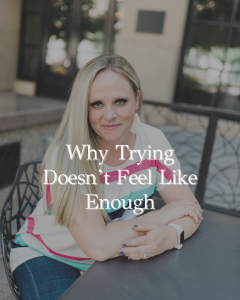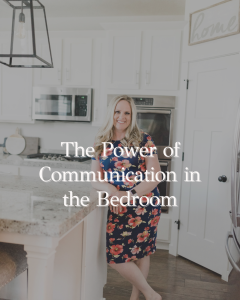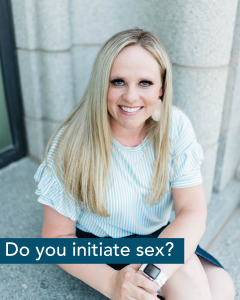
What do you want out of your marriage? I think we all want our marriages to be healthy and full of passion, right? But, how do you do that? Today I’m talking about the 4 keys to a healthy and passionate marriage. Can you disagree and still be close? Yes! Can you love your spouse for who they are, not who you wish they would be? Absolutely!


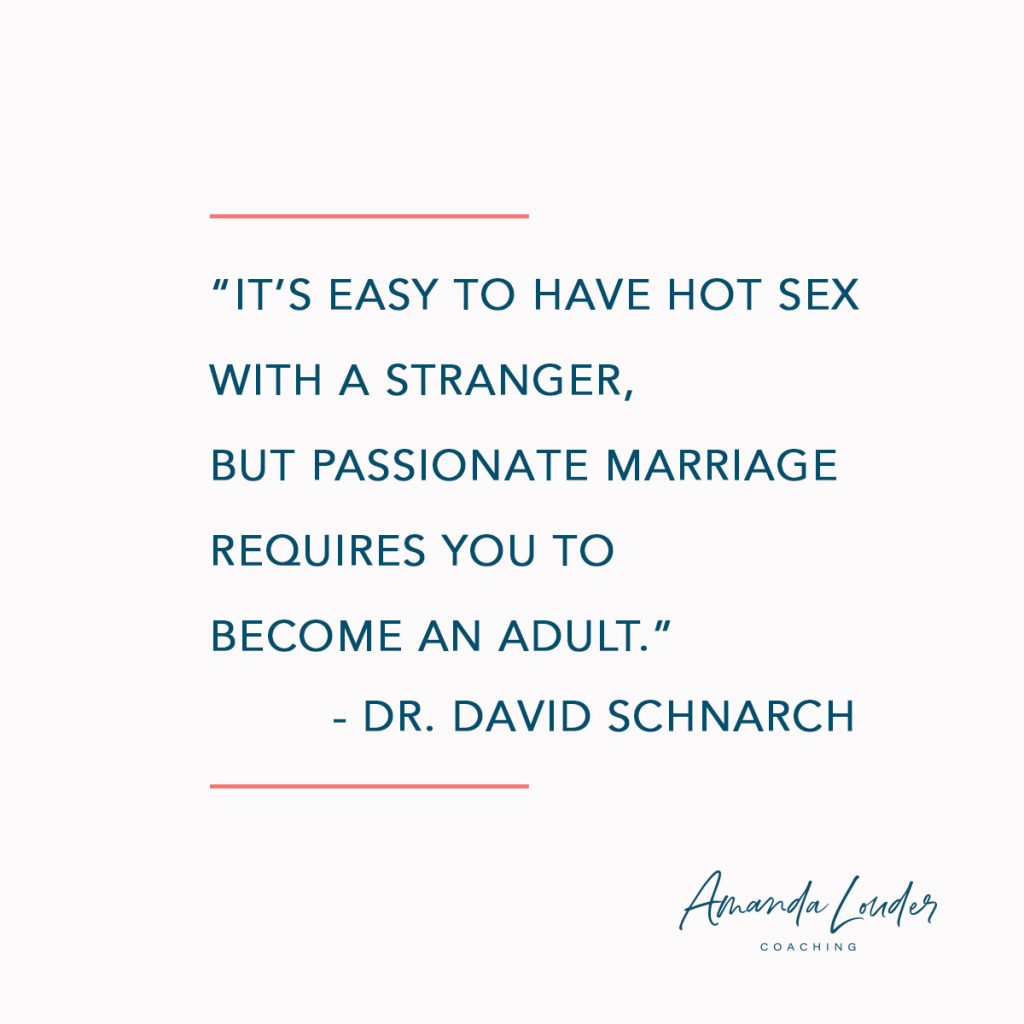
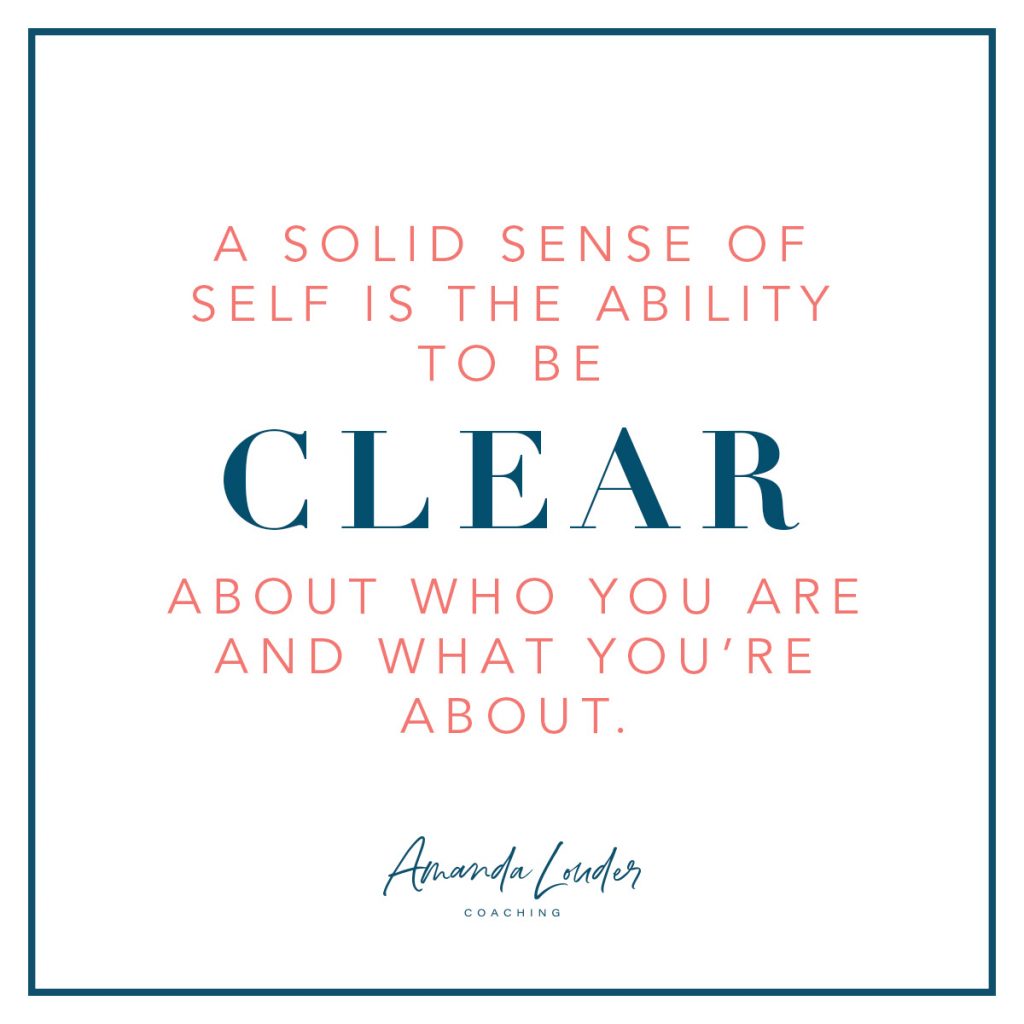
Show Notes:
Follow Amanda on Facebook and Instagram.
Join Amanda’s Private Facebook Group.
References for this episode:
Passionate Marriage by Dr. David Schnarch
Secrets of a Passionate Marriage by David Schnarch
Show Summary:
So today I want to talk about the 4 keys to a healthy, passionate marriage. These 4 keys are based on the book Passionate Marriage by Dr. David Schnarch. I highly recommend the book if you haven’t read it. It’s way more in depth of what I will go into today, and well worth your time. If you like audio, rather than reading, you can listen to a condensed version in Secrets of a Passionate Marriage. The full book isn’t available on audio and the condensed version isn’t available in print, so you can get one or the other or both!
So let’s dive right in, shall we?
Dr Schnarch’s work is all based in the practice of differentiation. His definition of differentiation is this “The ability to maintain your sense of self when you are emotionally and/or physically close to others – especially as they become important to you.”
Dr. Julie Hanks recently spoke of differentiation. She said, “Differentiation includes the ability to engage in life from a place of authenticity and integrity instead of from a “false self” or a “pretend self” that often develops to avoid conflict, keep the peace, or placate others.” (Dr. Julie Hanks)
So when it comes to having a healthy, passionate marriage Dr. Schnarch says, “It’s easy to have hot sex with a stranger, but passionate marriage requires that you become an adult.”
Becoming an emotional adult isn’t easy. It requires going against many things that we have been taught our entire lives about marriage. Because, why do so many people struggle in marriage? Because we are overly emotionally dependent on another human being. And when we are emotionally dependent, we tend not to speak our own mind, think our own thoughts, or go after our ambitions and dreams, because we think those things might take us away or make us not as close to our partner. We depend on our partner for safety, security, and to compensate for childhood disappointments. So instead of becoming independent adults, we stay immature and dependent on someone else. But a passionate marriage happens between two adults.
So let’s talk about what that looks like.
The first key to a healthy, passionate marriage is a solid but flexible self. So what does that mean? A solid sense of self is the ability to be clear about who you are and what you’re about. You know yourself. You understand yourself. You accept yourself as you are, the good and the bad. You are willing to self-confront and see what it is about you that might need to change to become a better version of yourself. It’s really about tapping into your integrity of who you are. But, you are also not rigid about it. You don’t think that everyone, including your spouse needs to be like you. You can be flexible. You can hold true to who you are and allow your spouse to be themselves.
Oftentimes, when we don’t have a solid sense of self, we want our spouse to conform to who we want them to be so that we can remain comfortable. But when you can be solid but flexible you can say “This is who I am and this is where I stand” and still be empathetic and flexible to where your partner is. It’s the ability to hold on to yourself and still be close to someone else.
So many couples think that they need to be the same in order to be close. But in a healthy marriage, both partners can be their own individual person, they can be different, and still be close.
Ester Perel said “There isn’t one way to have a marriage or sexual relationship. When you have a very narrow view, and you or your relationship doesn’t fit, there’s only one way to go – out.”
And I see that happening with many clients. When both partners don’t agree to what the relationship is supposed to look like, we begin to doubt. We question if we married the right person. If we are compatible or not. But when we can be solid but flexible, we can say “This is who I am and how I want to live, and I can allow you to be yourself and you don’t need to change in order to make me comfortable.”
Let me share with you an example. I had a client who was a very private person. She did not think that it was right or ok for anyone to talk about things that are personal. This is how she’d grown up and she very much valued privacy.
She told me that many, many years ago her daughter moved away with her only grandchild. And in an effort to share about their life in a new place, her daughter started a blog to share pictures and stories of the baby. This woman was horrified that her own daughter would “put her life on the internet” and shamed her for it. Fast forward a few years and Facebook started. And again, she was appalled that people would post all these very personal things about themselves.
Now, her husband was much more open. He didn’t hold the same beliefs and values as she did. But over time, in order to keep her comfortable, he conformed. Now, I don’t know if he did so consciously or it just happened, but he did change. Over time, she has changed a lot as well. Questioning her beliefs and if it is really ok to share more. Interesting, right?
Building a solid sense of self is at the core of my coaching program. Because without it, nothing else works. It is impossible to have a truly great, healthy, passionate marriage without it.
The second key to a healthy marriage is the ability to self-soothe. This is the ability to calm yourself down and regulate your own anxieties. And again, this comes from a solid sense of self, but it’s important in a relationship. When anxieties come up (because we all have them), can we be responsible for our own emotions and not either put that responsibility onto our spouse or take responsibility for their emotions.
There are a couple ways I see this come up with clients. The first is that we blame our emotions on things that our spouse says or does. We have anxiety about having sex because we see signals or our spouse comes our directly and asks for sex that night. And instead of looking inward into what might be causing those anxieties in us and learn to calm ourselves down, we blame them. We think they need to stop so that we can feel better. The second way I see this is when we see our spouse’s anxieties or negative emotions and we feel like we have to solve for them or fix them. Husband wants sex, he gets turned down, then he sulks, pouts, or even gets angry and we can’t tolerate his negative emotions so we have sex with him (even thought we don’t really want to) so that he will stop.
This is the next thing we work on in my program. Understanding emotions and learning to not only create the ones we want to feel (like desire) but learn how to tolerate and self-soothe for the ones that don’t feel great. Taking 100% responsibility for our emotions and 0% responsibility for our spouses. And that doesn’t mean we are cold-hearted and don’t care about their feelings. We do, of course. We just don’t take responsibility for them.
The third key to a healthy marriage is grounded responding. This is the ability to stay calm and not overreact. The ability to respond to a situation and show up the way that you want to. The ability to stay close and not pull away and not create distance even when you don’t agree. Can you respond from the best inside of you instead of reacting from the worst? This doesn’t mean self-sacrifice or becoming a martyr (which we often think is the right thing to do). But it’s really about tapping into our integrity and deciding who we want to be and what we want to do in the moment and not letting strong emotions overcome us. It’s about standing up for what you truly want in yourself and in your relationship, even when things get hard.
This work is not easy. But being able to show up as your best self, with intention, under any circumstance is a skill that can be learned. It definitely takes practice, and most likely you’ll never be perfect at it. But it is something that you can get much better at.
I know that this is something that I have personally practiced a lot in my relationships. Not only with my husband, but with my children as well. I love that so many of these things not only translate to a better marriage, but better relationships in all areas of your life. I realized that I really don’t yell at my kids anymore. I really don’t even get mad at them anymore. Sure, sometimes I get a little frustrated with things. But most of the time, I can check myself first and show up as the mom I want to be instead of the angry mom that used to show up quite a bit.
The fourth key to a healthy marriage, according to Dr. Schnarch, is meaningful endurance. When I used to hear the phrase “endure to the end” I thought it sounded miserable. And I guess it can be if you are enduring something that isn’t healthy. But with this key, it’s not about enduring something that you’re miserable in, it’s understanding that just because you fix something once doesn’t mean it’s not going to come up again and again. So this is about being able to step up and face the issues that come up again and again for you and your relationship. It’s your ability to allow discomfort for the sake of growth.
So here are some questions to ask yourself.
- Can I allow my spouse to be responsible for their own emotions and tolerate my own discomfort with their negative emotions?
- Can we disagree about something, but still remain close?
- Can I love my spouse for who they are and not just for who I want them to be?
If you need help with any of these, I want to invite you into my coaching program. This is the work that I do every day with clients. Helping them create a passionate and healthy marriage. And isn’t that what we all want? Isn’t that what we thought we were getting before life got in the way? Let’s help you achieve that. Making the dream of a healthy, passionate marriage a reality for you.

